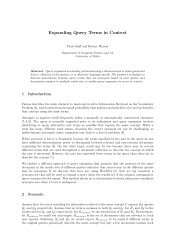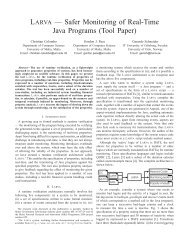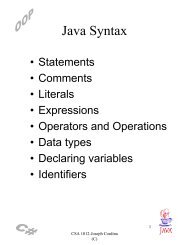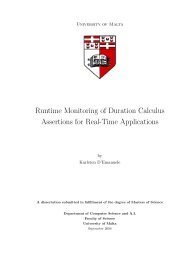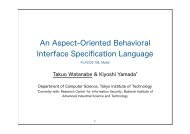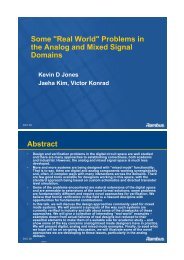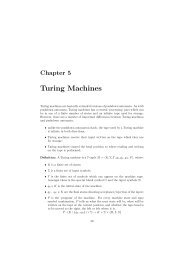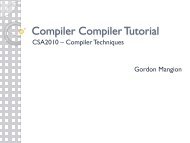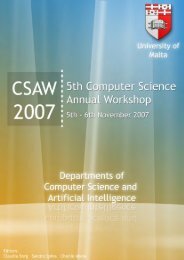Proceedings of CSAW'04 - FTP Directory Listing - University of Malta
Proceedings of CSAW'04 - FTP Directory Listing - University of Malta
Proceedings of CSAW'04 - FTP Directory Listing - University of Malta
You also want an ePaper? Increase the reach of your titles
YUMPU automatically turns print PDFs into web optimized ePapers that Google loves.
TTS Pre-processing Issues for Mixed Language Support 37<br />
Handling part <strong>of</strong> this task is the role <strong>of</strong> the pre-processing module. This is the first stage <strong>of</strong> input<br />
processing, organising the input text into a standard format that the following modules can process<br />
more easily ([2]). Amongst other things, it is generally responsible for converting numerals and<br />
acronyms into their textual interpretation and resolving punctuation. In specialised systems, other<br />
tasks may be required <strong>of</strong> it. For example, in an email to speech system, the pre-processor will be<br />
required to remove unnecessary email headers and superfluous formatting. (See [3] for examples.)<br />
In designing a TTS system supporting Maltese for SMS messages in the local context, pre-processing<br />
issues specific to this domain are encountered. These will be illustrated in some detail and techniques<br />
with which they may be addressed will be discussed.<br />
2 Mixed Language Support<br />
In the domain <strong>of</strong> concern, the specific pre-processing issues arise out <strong>of</strong> the mixed language nature<br />
<strong>of</strong> the text, the mechanisms used to artificially shorten the messages, orthographic errors and<br />
device limitations. The two main concerns, code switching and character encoding support, are<br />
discussed below. Another pre-processing issue is the handling <strong>of</strong> smileys, such as ;->, and other<br />
abbreviations typical <strong>of</strong> the SMS domain. This however, can be handled by a simple rewrite process<br />
from well-known lists <strong>of</strong> such common shortcuts.<br />
2.1 Bilinguality and Code Switching<br />
The Maltese Islands are <strong>of</strong>ficially bilingual, with both Maltese and English as <strong>of</strong>ficial languages<br />
<strong>of</strong> the country. English is generally understood as British English, while an <strong>of</strong>ficial version <strong>of</strong><br />
Maltese, <strong>of</strong>ten termed as Standard Maltese (see [4] and [5]) is commonly taught in schools. The<br />
latter is distinguished from dialects <strong>of</strong> Maltese that may be found in certain villages and localities,<br />
which differ subtly at various levels <strong>of</strong> structure (including syntactic, lexical, grammatical and<br />
intonational.)<br />
In practice, however, this bilingual situation brings forth a heterogeneous mixture <strong>of</strong> language<br />
use. For various geographical and sociological reasons ([4]), the use <strong>of</strong> Maltese, whether spoken<br />
or written, is <strong>of</strong>ten interspersed with words or phrases in English 2 , a phenomenon known as code<br />
switching. Conversely, the local use <strong>of</strong> English is <strong>of</strong>ten marked by certain grammatical and phonetic<br />
differences, to the extent that some may want to refer to it as a “Maltese English” dialect ([6]).<br />
For an appreciation <strong>of</strong> the above, consider, for instance, the following (real-life) SMS text message<br />
sample:<br />
“jaqaw bdejt tibza tixel il car xorta qajjimt il qattusa u issa qed tajjat wara il bieb.<br />
bring that btl <strong>of</strong> last time plz qalbi :)”<br />
The extent to which such code switching is acceptable as proper use <strong>of</strong> the Maltese language (or<br />
whether “Maltese English” may be truly considered an English dialect as opposed to a result <strong>of</strong> a<br />
lack <strong>of</strong> linguistic sophistication) is a matter <strong>of</strong> near religious debate ([6]). Rather than going into<br />
the respective merits <strong>of</strong> such considerations, a pragmatic approach is preferred whereby this state<br />
2 And, to a lesser extent, with words in other languages, most typically in Italian.



